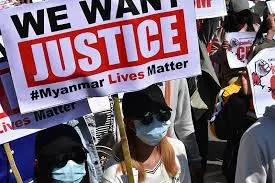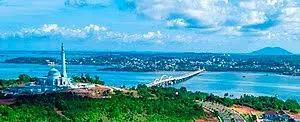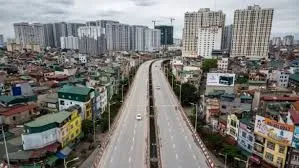The people of Burma, now under a military dictatorship, are showing their support for the Ukrainian people facing Russian aggression.
But the international response to the crisis is disappointing, writes Zakhari Abuza. The people of Burma have bravely resisted non-violent civil disobedience and armed insurgency since the military took power on February 1 last year.
In the case of Ukraine, the National Unity Government immediately declared its opposition to the Russian aggression, and the coup council expressed Russia's support.
However, the NUG government, which has the overwhelming support of the Burmese people, has so far not been officially recognized by any government and is still fighting alone.
The United States and the European Union (EU) are currently targeting coup leaders and their families, as well as military-owned businesses, but other key partners include Japan and the United States. South Korea Australia and Singapore have not yet imposed sanctions. The United States controls $ 1 billion in foreign reserves in Burma, but Japan and Singapore have refused to do the same.
The United States has sought to provide humanitarian aid to Burma through the NUG and civil society organizations, rather than through the military council, but has not yet been allowed to withdraw $ 1 billion in US government reserves from the NUG. As a result, the NUG is not receiving the kind of effective assistance that Ukraine is receiving.
This means that democracies around the world are now using economic and political sanctions against Russia. This is in stark contrast to the hasty imposition of financial and travel bans. Countries such as Singapore and Australia, which have been slow to act on Burma, are now in control of 40 percent of Russia's $ 630 billion foreign exchange.
Countries such as Finland and Sweden, which have traditionally been neutral, are supplying weapons to Ukraine. Countries like Switzerland and Monaco, which hold banks that hold the assets of the wealthy around the world, immediately seized control of the assets of Russian leaders, and questioned the international outcry.
First, Russia's actions violate international law and all the fundamental principles of peace and security, as it invades a sovereign state.
Despite military coups and serious war crimes in Burma, everything is happening within Burma's borders. Burma's neighbor, Southeast Asia, and other countries are also hiding under the pretext of non-interference in the internal affairs of other countries, the author said.
Second, there are concerns that the conflict in Ukraine could escalate and spread to other European countries. If Russia were able to quell the attacks in Ukraine, it could be a reason for Putin to target other NATO members that supply arms to Ukraine and the former Soviet Union.
Although the Burmese military has been involved in arson attacks on civilians, the Burmese military's strength is insignificant compared to the Russian military's ability to do so.
The third reason is that Myanmar is very, very important on a global scale. Ukraine is a major food exporter for the whole of Europe and a transit point for energy and gas pipelines to Europe.
In addition, Ukraine is increasingly leaving the shadow of Russia. Closer ties to Europe are also a factor in Putin's war of aggression.
The fourth reason is that Ukrainian President Vladimir Putin has won the support of the West. Burma's pro-democracy leader Aung San Suu Kyi has lost the support of the West because the military has protected the Rohingya from committing genocide.
Finally, There are large numbers of Ukrainians throughout the United States and Europe. Ukraine is seen as part of the West. The author argues that the reaction was different from what happened in Burma, which did not have a similar situation.
These differences are frustrating for the NUG, but they also need to take advantage of the situation in Ukraine.
Russia, which is now waging a war of aggression, needs to use its own resources. It is no longer a priority to supply arms to the Burmese military. The author says sanctions have made it harder for the Burmese military to pay, and that sanctions could now be used to intercept international cargo ships carrying Russian weapons.
In addition, Russia's invasion of Ukraine has increased the need for international protection of democracy. The author says the Burmese military can no longer rule out the possibility of a coup d'état and retaliation. Tott and Chevron have now been forced to leave Burma to cut off the Burmese military's energy revenue. The author says that NUG needs to do more than that.
He also said that NUG should take with it the fact that the Ukrainian government has successfully shaped the whole Russian aggression in the way it wants.
Author's message that authoritarian governments around the world can no longer oppress civilians as the International Criminal Court (ICC) has begun investigating Russia's war crimes ventures in Ukraine.
Finally, the NUG and the people of Burma will be empowered by realizing that they are not the only ones fighting the dictator.
Zakhari Abuza is a professor at Georgetown University and Washington National Military University in the United States. I would also like to point out that we are not affiliated with the organizations that work with Independent Voice of Asia.
Tanjungpinang KUD Fish Market collapses, dozens of motorbikes are buried : Riau Islands
Tanjungpinang - The KUD Fish Market in Tanjungpinang City, Riau Islands Province, which is located above the sea, collapsed, causing dozens of motorbikes parked in the alley to be buried by building debris, Saturday morning.
Director of BUMD Tanjungpinang, Fahmi, in Tanjungpinang, Saturday morning, said that until now there have been no reports of casualties in the incident.
"There were a number of motorbikes that were dragged into the sea when the building collapsed," he said.
Dozens of videos related to the collapsed Tanjungpinang KUD Fish Market building circulated on social media.
Based on observations, dozens of people tried to lift motorbikes that were around the ruins of the building.
The collapse of this building occurred twice in the last two weeks.
Fahmi admitted that he had reminded traders not to sell at the Tanjungpinang KUD Fish Market after the first incident some of the buildings collapsed. However, traders continue to sell at that location because they have no other choice.
The relocation at the Bestari Mini Market near the Tanjungpinang KUD Fish Market was unsuccessful because the available stalls still had to be repaired.
Traders don't mind moving to the Bestari Mini Market, but the stalls where they sell have not been repaired.
"There are about 100 permanent tables available at the Tanjungpinang KUD Fish Market. Traders have been reminded not to sell for a while," he said.
He emphasized that the Tanjungpinang BUMD does not have the capacity to deal with market building issues. Tanjungpinang BUMD manages the tables and stalls available in the market.
The Tanjungpinang KUD Fish Market has existed since the Riau Islands was still a district, which is in the administrative area of Riau Province. The market age is about 25 years.
"We only manage from the business aspect," he said.
Reform lessons for Vietnam learned from the Chinese model
Studying the performance of the China model (See: Fifty Years of the China Model, RFA, 1/3) over a long period of time shows cycles of ups and downs, rough starts, growth and retention, and recession, characteristic and typical of totalitarian, authoritarian regimes that have their roots even in feudal centralism, and at the same time indicate that China is in the decline of the cycle and The suggestion is open to the prediction of either a return to Mao-style socialism or the eventual collapse of democratic transition as the inevitable outcome. This is especially important for Vietnam, a copy of this model, which has not been publicly acknowledged but has been entangled in the "golden circle" of pragmatic thinking of Chinese origin, how can it be broken. to continue reforming even to seek opportunities for democratic transition.
The creative application of pragmatic thought should be understood as not letting the dogmatic socialist ideology hold back. According to pragmatism, the importance and correctness of an ideology, doctrine, etc., is determined by the results and practical effects of a policy or decision by a party organization, government or individual. human leader. The general idea through Deng Xiaoping's statement about the "black cat and white cat" has been developed strongly, practically and throughout in China. Marxist-Leninist ideology and socialist ideology are the theoretical foundation of the communist one-party to maintain the totalitarian regime, however, the pragmatic philosophy tells us to still "maintain" it but not to be "conservative" so as not to create barriers in thinking and acting towards results that benefit the people and the country. And that, let's "put it aside", consider it a "strategy", as a step back from the long-term strategy to develop productive forces towards socialism. In this respect the Chinese model has lasted for almost a third of a century.
Pragmatism (from the Greek πραγματος — "action, action"; English: pragmatism), also known as activism, is a colloquial term for behavior based on situation facts are known, so practical action is based on theoretical reasoning. In pragmatism, the truth of an ideology, doctrine or theory is judged by its practical success, so pragmatic action is not tied to the immutable principle.
Pragmatism contains deep and complex philosophical thought. It has been developed as a philosophical and sociological school from the end of the 19th century to the present, especially in the US, considered as a thinking style and a style of action. There is debate, even criticism of the opportunism of American pragmatism, yet it is not fully understood that this very ideology is based on libertarianism and supported supported by the American rule of law based on the separation of powers, effective control of power, creating a dynamic balance. Such pragmatism has fostered relatively sustained economic and democratic development.
China's elites realize this as they create their own branded pragmatism, confronting the infiltration of Western-style democracy from influencing the leadership and management of economic transformation. market by promoting a separate doctrine, the theory of national sovereignty with Han nationalism, behind it is the "court theorist" Vuong Ho Ninh, one of the seven members of the Standing Committee of the Politburo. ruling Communist Party of China, an ideologically important figure second only to General Secretary Xi Jinping. This theory is considered as an "invisible" glue or material that binds the Marxist-Leninist ideology to maintain the regime with ideal values far removed from the essential market reality, close to life. people's social life, in which fact is regarded as truth and precedes and precedes doctrine or ideology.
Leaders seem for a while to fail to realize that pragmatic policy practices have created a crony capitalist and nationalist Chinese state underpinning the regime. Even when the Hoang Sa and Gac Ma islands were invaded, economic dependence such as inadequacies in the trade balance, disturbances in the small-scale market and important and inefficient projects in the energy industry , traffic ... even though it has been warned by experts, it has not been overcome. The late Singaporean Prime Minister Lee Kuan Yew since the 1990s, when visiting and consulting with Vietnamese leaders such as the late Prime Minister Vo Van Kiet, has revealed an allusion to the fact that the ideology of socialism is being held. and action. The consideration of socialist ideology as a matter of great sensitivity has hindered the application of pragmatic philosophy in practice.
As the undeniable consequence that the cycle of ups and downs in the operation of the Doi Moi policy could not be maintained for as long as desired, the difficult beginning period was considered in 1986 at the 6th Congress of the Communist Party of Vietnam, the period of relatively high but unsustainable growth lasted only until the “macroeconomic and institutional instability” in the years before and after the 11th National Congress. The beginning, as a cause, for the period. The prolonged recession so far is the mistake of hasty growth policies based on economic groups and state-owned corporations, the main socialist component in the economy.
The most obvious manifestation is the state of "one, two, two, one" between the party body in charge of politics and the specialized technocratic departments of the government, not supported by the mechanism of decentralization and control. clear and effective power. Thus, instability is an internal party issue, rather than the word "superior". The Party was unable to discipline the former prime minister of this period because of the party's comprehensive leadership and its principle of collective leadership!
The reforms implemented, despite "great efforts" during the two terms of the 11th and 12th Communist Party Congresses and now the 13th Party Congress, have not really ended the recession period. The position of General Secretary of the party had to use twice "special cases" to break age and term limits to prolong power. Many regulations and standards on cadres have tightened and supplemented functions and powers for party organs in terms of anti-corruption, anti-corruption, and ethics. Tens of thousands of party organizations, cadres, leaders, and members, including the highest-ranking members of the Politburo, were disciplined by the party and served various prison terms. Dozens of cadres have been purged or rotated to different positions… The Communist Party of Vietnam has acknowledged the need for political reform and is betting institutional reform on cadre organization and anti-corruption work!
Such party rectification moves towards greater concentration of party power, as a step back rather than a step towards democracy and controlling corruption. Market reforms and operations have been "stagnant", even "stalemate" in many areas and localities because national corruption is still rampant. In addition, the danger of clinging to a dogmatic ideology tends to be exacerbated, propaganda is launching to "protect the ideological foundation of the Party", "court" theorists argue for this model. The "socialist-oriented market economy" is a creation of the Party.
Many other specific factors make it impossible for Vietnam to "copy" the Chinese model, but a full and profound understanding of pragmatism as one can promote progressive reform, in which two issues: The core theme of the lesson needs the attention of reformers. First, learn specifically about pragmatism to get rid of the ideological obsession and economic dependence on China itself; And, secondly, the recession reveals the declining stage of the cycle of centralism, which cannot be "pragmatic" forever, thereby raising the question of whether there is any opportunity for democratic transformation? For now this may be a narrow slit, but at some point the door will open. Let's know hope!
* The article does not represent the views of Radio Free Asia.
Tags:
asiaeast
bangladesh
china
indonesia
japan earthquakes
malaysia
myanmar
north korea
south korea







